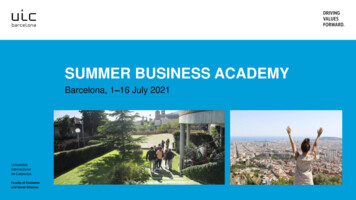
Transcription
UIC PASSENGER DEPARTMENTPassenger Activities at UICJuly 2021
CONTENTSFOREWORD. 3PRESENTATION. 4UIC LEAFLETS & INTERNATIONAL RAILWAY SOLUTIONS. 6STRUCTURE OF THE UIC PASSENGER DEPARTMENT. 7ORGANISATION. 8GLOBAL PASSENGER FORUM. 9HIGH-LEVEL PASSENGER MEETING. 10RIC/A SPECIAL GROUP. 11PASSENGER SERVICES GROUP.12 Strategic priorities and objectives.13Relationship with other bodies and partners.13PATRIC (audit). 14MERITS. 14OSDM Platform.15PASSAGE.16Passenger Experts Subgroup.17Passenger Service Group IRSS.21INTERCITY & HIGH-SPEED SECTOR.22 A comprehensive system allowing door-to-door transportation.22Intercity & High-Speed sector.23Statistics – database and high-speed world.23Alliance of Universities for High-Speed Rail:“Working together for mutual benefit”.23High-Speed rail projects. 24International Railway Solutions for High-Speed Rail.25Night Trains Working Group.25COMMUTER AND REGIONAL TRAIN SERVICES. 26 Railways used by 90% of passengers in the world.26TOURISM OPPORTUNITIES FOR RAILWAYS (TOPRAIL). 28 Fostering international cooperation regarding tourism by rail. 28Tackling the challenges of rail tourism. 28Activity. 28STATION MANAGERS GLOBAL GROUP.32 Organisation chart.33Strategic axes and objectives.33Station and Urban Design Working Group. 34Facility Management and Operation Working Group. 34Retail and Commercial Affairs Working Group.35Small Stations Working Group.35UIC nextstation o part of this publication may be copied, reproduced or distributed by any means whatsoever, including electronic,except for private and individual use, without the express permission of the International Union of Railways (UIC).The same applies for translation, adaptation or transformation, arrangement or reproduction by any method orprocedure whatsoever. The sole exceptions - noting the author’s name and the source - are “analyses and briefquotations justified by the critical, argumentative, educational, scientific or informative nature of the publication intowhich they are incorporated” (Articles L 122-4 and L122-5 of the French Intellectual Property Code). International Union of Railways (UIC) - Paris, 2021
PASSENGER ACTIVITIES AT UICFOREWORDSince the previous brochure in 2019, the UIC Passenger departmenthas continued to address the current and future challenges facingpassenger rail operators across the globe by supplying its memberswith unique technical support on issues impacting passengerproductivity.Passenger rail activity has been strongly affected by the Covid-19crisis, and while the railways have continued to contribute to thegrowth of rail transport during the pandemic, the latter has revealedthe urgent need for a change in mobility habits and for moreinvestment in the railways within the next 10 years.François DavenneUIC Director GeneralThe post-Covid period is an opportunity with regard to climatechange for policy makers and the financial sector to invest in areassuch as high-speed rail and to finance transformational projectsat regional and global level to achieve more efficiency in the shortterm. Projects to develop digitalisation, seamless interconnectionwith other modes and more capacity of existing infrastructures willdrive a modal shift to rail and public transport, which is essentialin order to achieve the Sustainable Development Goals (SDGs) andthe Green Deal in Europe. These developments will also impactcustomer experience, with most passengers by 2030 being ableto benefit from e-ticketing, multimodal travel information andseamless journeys.This brochure covers the latest progress and developments ina number of key areas, notably OSDM (Open Sales & DistributionModel), multimodality, research and innovation, accessibility, thecustomer experience both onboard and in stations, sustainable railtourism, new IRSs in passenger services and high-speed rail, not tomention the 7th UIC nextstation conference and the 11th UIC WorldCongress on High-Speed Rail planned for 2022.These projects are testament to the priority our members attachto improving the efficiency of the passenger sector and highlightUIC’s role as a solution-oriented forum for cooperation, dialogueand sharing best practice at both European and global level.As the railway community recovers from the pandemic and preparesthe “new normal” for rail travel, innovative solutions, a coordinatedresponse and a clear vision of the future of railways will be vital toensure that rail is ready for the mobility challenges ahead and canposition itself as the backbone of tomorrow’s sustainable transportparadigm, in which passenger rail will have a critical role to play.3
PRESENTATIONMarc GuigonUIC Passenger Director4UIC is the worldwide organisation for the promotion of rail transportat a global level and the collaborative development of the railwaysystem. It brings together some 200 members on all five continents,comprised of rail operators, infrastructure managers, railway serviceproviders, etc. UIC maintains close cooperative links with all actors inthe field of rail transport around the world, including manufacturers,railway associations, public authorities and stakeholders in otherfields and sectors whose experiences may be beneficial to raildevelopment. UIC’s main tasks include understanding the businessneeds of the rail community, promoting railways worldwide,developing innovation programmes to identify solutions to theseneeds, and preparing and publishing a series of documents,known as International Railway Solutions (IRS), to facilitate theimplementation of these innovative solutions.
PASSENGER ACTIVITIES AT UICGENERAL CONTEXT OF THE PASSENGER RAILBUSINESSRail passenger transport accounts for 50%of all rail activity, 8% of overall passengertransport, 1% of passenger transport CO2emissions, less than 2% of passengertransport GHG emissions, and is believed tobe the backbone of future mobility.With the emergence of new technologies,changes in customer behaviour and choicesregarding mobility, and the developmentof competition in the rail sector, railwayundertakings and infrastructure managersare shifting towards a more customercentred approach when providing services,investing in innovation and research to offermore personalised and seamless journeys.Against this background, the UIC PassengerDepartment acts as a lever to transform therailway business by offering sectoral technicalsolutions (IRS), opportunities for knowledgeexchange, networking platforms and tools,and support for the whole rail sector: railwayundertakings and infrastructure managers,but also decision makers, research centres,universities or Ticket Vendors, for all aspectsrelated to rail passenger transport.Work at the UIC in the field of rail passengertransport is guided by the members throughtheir participation in the Global PassengerForum, and is divided into five Sectors:À Passenger Services Group,À Intercity and High-Speed Committee,À Commuter and Regional Train Services,À Station Managers Global Group, andÀ Tourism Opportunities for Railways,and one Special Group: RIC/A (Agreementson the exchange and use of passenger carsand self-propelled units in international railtraffic).5
UIC LEAFLETS & INTERNATIONALRAILWAY SOLUTIONSIn a complex railway system, functional andoperational aspects are essential and mustbe defined by the users: railway undertakings(RU) and infrastructure managers (IM).Consequently, users must define theirrequirements and functional specificationsbefore handing these over, where applicable,to standardisation organisations. Thisapproach guarantees that RUs and IMs willultimately obtain from the market the mostappropriate products corresponding to theirneeds in terms of services and quality.6UIC is committed to:À Fosteringcooperation between itsmembers to define requirements andfunctional specifications;À Ensuring the link with standardisationorganisations (CEN-CENELEC, ETSI, ISO,IEC1) so that they study the technical impacts of these requirements and specifications and then define manufacturing standards ensuring interoperabilitybetween existing and future ‘technicalbuilding blocks’;À Facilitating the convergence of operationalrules between RUs and IMs; andÀ Publishing test specifications and main-tenance frameworks on behalf of RUsand IMs.ByusingUIC’srequirementsandspecifications, standardisation organisationsget the direct benefit of global influence.Consequently, it is essential that crossreference schemes for documents areestablished between these organisationsand UIC, and even extended to documentsproduced by other sector stakeholders,such as (non-exhaustively) OSJD2, ERA3 orOTIF4. This is the simplest way to ensureconsistency and to avoid potential overlapsor gaps between these essential documents.UIC’s documentation assets can takemultiple forms: technical and researchreports, guidelines, technical specifications,and IRSs (International Railway Solutions),which benefit directly from the legacy of thewell-known UIC leaflets as part of a globalmigration programme, with a systematicfive-year review of each IRS.All these publications are available on the UIC RailwayTechnical Publication website: www.shop-etf.com.1.2.3.4.CEN and CENELEC are business catalysts in Europe, removing trade barriers for European industry and consumers. Theirmission is to foster the European economy in global trading, the welfare of European citizens and the environment. Throughtheir services, they provide platforms for the development of European standards and other technical specifications.ETSI is a regional standards body (recognised by European Standards Organizations (ESO)) dealing with telecommunications,broadcasting and other electronic communications networks and services.ISO – International Standardization Organization.IEC – International Standards and Conformity Assessment for electrical technologies – European standardsOrganisation for Cooperation of RailwaysEuropean Union Agency for RailwaysOrganisation intergouvernementale pour les transports internationaux ferroviaires
PASSENGER ACTIVITIES AT UICSTRUCTURE OF THE UICPASSENGER DEPARTMENTUIC/CERHigh Level PassengerMeetingInterCity &High-SpeedCommitteePassengerServices GroupGLOBALPASSENGERFORUMStation ManagersGlobal GroupCommuter & RegionalTrain Services7RIC/AGLOBAL PASSENGER FORUM OrganisationchartSpecial GroupTourism Opportunitiesfor RailwaysManel Villalante ILlauradó (Renfe)Marc GuigonDmitriy Pegov (RZD)Beatrix PerrotGlobal Passenger Forum ChairHuang Xin (CR)Global Passenger Forum Vice-ChairCommuter & Regional Train ServicesVanessa PerezPASSAGE – CRTS – TopRailGlobal Passenger Forum Vice-ChairTourism Opportunities for RailwaysVanessa PerezPASSAGE – CRTS – TopRailPassenger DirectorAssistantStation Managers Global GroupClément GautierStations and Intermodal HubsCécile GendrotProject DisseminationPassenger Services GroupJosef FazikRIC/A Special groupIntercity and High-SpeedFabrice SettaPhilippe LorandDavid SarfattiKenta TakashinaPassenger Services GroupPassenger Services GroupSylvain CastelotMERITS Data ManagerPassenger TransportInterCity & High-Speed
ORGANISATIONUIC/CER High LevelPassenger MeetingGLOBALPASSENGERFORUMSpecial Group RIC/AM. Villalante i LlauradóRenfeM. Villalante i LlauradóRenfeP. VieSNCFM. GuigonM. GuigonJ. Fazik8TourismOpportunitiesfor Railways(TOPRAIL)PassengerServicesGroupStation ManagersGlobal GroupInterCity &High-SpeedCommittee/WCHSC. CasasFGCV. CartaDBF. MorenonSNCF - GCHUO BSChina State RailwayGroup Co., LtdV. PérezF. SettaC. GautierP. LorandCommuter &Regional TrainServicesV. Pérez
PASSENGER ACTIVITIES AT UICGLOBAL PASSENGERFORUMThe UIC Global Passenger Forum was set up so that members all overthe world could jointly adopt a global approach to UIC Passengeractivity, encompassing the five passenger sectors (Intercity andHigh-Speed, Commuter and Regional Trains, Stations, PassengerServices Group and TopRail) and relevant projects, and discuss andset common priorities, strategies and directives, eventually to becoordinated with other forums and platforms where appropriate.The purpose of the UIC Global Passenger Forum is to:À Set out a global and strategic vision for UIC Passenger activities,and establish guidelines and priority lines of work;Manel Villalante iLlauradóChairman of the GlobalPassenger ForumDirector General ofDevelopmentand Strategy of RenfeÀ Transversely coordinate and supervise Passenger-related workconducted by the five groups and committees;À Collect results and deliverables from the different activities andprojects undertaken, with a view to disseminating outcomesas widely as possible among members, within the scope of theapplicable intellectual property rights;À Select and endorse candidates put forward for the positions ofchair or other roles within the groups and committees, to beratified by the UIC General Assembly in accordance with UICStatutes;À Coordinate with the Rail System Forum and other platforms,such as Digitalisation, Standardisation, RICG5, Safety, etc., on keyissues relating to Passenger activity;À Promote and facilitate meetings with other organisationsrelevant to passenger transport, such as UITP6, CIT7, OSJD8, CER9,RNE10, Association of American Railroads (AAR), etc.À Integrate and coordinate, in a coherent and consistent way,activities and projects relating to passenger transport developedat the regional level of UIC. Recommend that the GeneralAssembly approve cross-regional projects and activities adoptedby the various groups and committees under the PassengerGlobal Forum.5.6.7.8.9.10.Research and Innovation Coordination GroupInternational Union of Public TransportInternational Rail Transport CommitteeOrganisation for Cooperation of RailwaysCommunity of European Railway and Infrastructure CompaniesRailNetEurope9
HIGH-LEVEL PASSENGER MEETINGThe High-Level Passenger Meeting (HLPM),co-organised by UIC and CER, is an eventaimed at European Passenger CEOs todiscuss strategic topics relating to thechallenges faced by the European railways.This meeting brings top managers fromPassenger railway companies across Europetogether for discussions on importantrail passenger transport policy issues.The purpose of this meeting is to reviewkey questions about European railwaypassenger policy, and to address thetechnical and political challenges facingpassenger transport in the future.10During the last HLPM on 2 October 2020, thefocus was on the development of the OSDM(Open Sales and Distribution Model), as perthe resolution from the previous HLPM. Onestandard had been developed, comprisingtwo parts: OSDM Platform and OSDM Online.Other topics were also discussed, such assupport for companies during the Covid-19pandemic, the start of the International RailPassenger Platform, and the opportunitiesfor flight substitution via rail in Europe.The next HLPM will be held on 8 October 2021in Paris, and Passenger CEOs will discussstrategic subjects, including distribution,the ‘New Normal’ and new services.
PASSENGER ACTIVITIES AT UICRIC/ASPECIAL GROUPThe RIC/A11 Special Group and its Secretariat,which is attached to the UIC PassengerDepartment, administers the RIC and RIAAgreements. These agreements governthe exchange and use of coaches and selfpropelled units in international traffic, subjectof the RIC since 1922. These agreements,which take the form of a multilateralcontract, describe the responsibilities of theactors involved (RUs and keepers) in thesaid exchange and must be continuouslyadapted to allow the reciprocal use ofpassenger coaches or self-propelled units ininternational traffic. To ensure this, expertsdraw up amendments, which are put tothe vote at the General Assembly of theRIC/A. The agreements, updated by any newamendments, are published and enter intoforce each January. Access is limited to RICand RIA members only.To facilitate the exchange of passengertrains, RUs apply the ATI Agreement (alsoadministered within RIC/A). This agreementbetween RUs (RIC members) allows for thedelivery of trains so that this rolling stockmay be waived for the technical acceptanceexamination. This advantage is based onthe membership of an RU (accepted by itsexchange partners) and the assessmentof the quality management system (QMS),making it possible to determine the level ofquality per member compared to the trainsexchanged.Philippe ViéThe QMS is an integral part of the RIC andRIA Agreements and is based on ISO 2859.This QMS is stipulated by Regulation (EU)2018/762 and Directive (EU) 2016/79812 tocomply with safety rules. With the aim ofintegrating the digitised technology of theQMS, RUs are gradually developing theimplementation of common software fromthe year 2020. This implementation strategyoffers the following benefits:À A representative overview of the level ofquality achieved by an RU or a vehiclekeeper for the entire fleet exchangedunder RIC or RIA rulesÀ Compliance with the control processdefined in the QMS, as the controller issupported on identical softwareÀ Identical inventory report and display ofresults, common to all membersÀ Timely notification to all members in caseof serious defects on vehiclesThe software testing phase carried out bya few RUs shows that the application isworking properly. The validation of the testphase will make it possible to define thenecessary software adjustments. After thetest phase and on the contractual basis ofUIC and the provider of this service from theÖBB, the generalisation of this software to allmembers of the RIC/A SG can be developed.The goal is that this generalisation willstart for the next schedule change inDecember 2021.11. Regolamento Internazionale delle Carrozze / dei Treni Automotori12. i CELEX:32018R076211
PASSENGER SERVICESGROUPVittorio CartaPASSENGER SERVICES GROUPChair: Vittorio Carta, DB AGVice-chair: Begoña Delicado, SNCF VoyageursVice-chair: Frauke Quik, NSSecretary: Sandra Ferrari, Trenitalia S.p.A.UIC: Fabrice SettaUIC: Vanessa PérezUIC: David SarfattiRelationship withPassenger Expertsother bodies: CER,SubgroupCIT, ERA.UIC: Marc GuigonUIC: Fabrice SettaChair: Luca MariorenziTrenitalia S.p.A.PATRIC (Audit)PASSAGEMERITSOSDM PlatformChair: Olivier RoySNCFChair: Paola NegriTrenitalia S.p.A.UIC: Fabrice SettaUIC: David SarfattiPersons withReduced MobilityAssistance BookingToolTTEG (Time TableExpert Group)Chair: David SarfattiUICUIC: Fabrice Setta12The Passenger Services Group playsafundamentalmanagementandcoordination role for all Passenger activitiesrelated to technical and commercial issues,including those areas concerning tariffconditions and technical standards andinterfaces for European/international salesand systems.Beyond these two main branches, includedin the Passenger Experts Subgroup (PES),the PSG also addresses the management ofMERITS (a unique database for the mutualexchange of data on timetables and stationsbetween RUs) and issues related to tools andassistance for PRMs (Persons with ReducedMobility – PASSAGE activities). Auditactivity for the monitoring of the properimplementation of financial standards by RUsis also supervised through the contributionof the PATRIC13 working group.13. Passenger Accounts and Ticketing Rules Inspection Committee
PASSENGER ACTIVITIES AT UICSTRATEGIC PRIORITIES AND OBJECTIVESDistribution: The PSG is actively involved inthe commercial and distribution domains,with the aim of consolidating existingcooperation and further improving currentinitiatives. Follow-up and implementation ofOSDM will be part of the PSG agenda.Commercialisation of MERITS database:The PSG, through the MERITS SteeringBoard, analyses the MERITS evolution andother developments.New projects will be focused on n workshops, and the Air Railand Door2Door projects, together with twoother projects:À Next generation revenue sharingGlobal Passenger Forum (GPF): Thefollowing PSG priorities have been endorsedby the GPF:À OSDM implementationÀ MERITS enhancementÀ Multimodalitywith urban and airtransportation (Door2Door and Air Railprojects)À Development of e-ticketing (ElectronicTicket Control Database [ETCD])À Innovation workshopsÀ “Day of travel” to support passengers in13the event of delays and disruptionsRELATIONSHIP WITH OTHER BODIES AND PARTNERSThe PSG is actively working with theEuropean Union Agency for Railways (EUAR)for the synchronisation of UIC IRS with EUARTAP-TSI Technical Documents as part of theUIC - EUAR14 Technical Agreement.À CIT is also a partner to highlight andÀ OSJD: joint management of OSJD/UICÀ Multimodality is a core objective of PSGIRSs and leafletsÀ PSGalso works closely with CERconcerning TAP-TSI15 regulations and14.15.16.17.relations with theAgency for RailwaysEuropeanUnionsolve legal issues like ticket layout, GDPR,Passenger Claims conference, PRR16, etc.so there is close cooperation with UITP,IATA17 and STA for the intermodal projectsDoor2Door and Air RailEuropean Union Agency for Railways.Telematics Applications for Passenger-Technical Specification for interoperability.Passenger Rights and regulations.International Air Transport Association.
PATRIC (AUDIT)Passenger Accounts and Ticketing RulesInspection CommitteeThe cross-distribution of domestic andinternational tickets is based on multilateralagreements provided by UIC IRS 909181, IRS 90918-8, IRS 90918-9, UIC Leaflet 301(accounting) and the Special Conditions ofInternational Carriage (SCIC) for differenttypes of ticket. However, these transactionsare not always underpinned by automateddata exchange with the vendor system.Therefore, the accounts kept for certaintypes of ticket are based on the subsequentupload of sales data sets into internationalaccounting systems in accordance with UICLeaflet 301.14Olivier RoyIn this context, the carriers trust that therevenue from the sale of tickets to whichticket issuers are entitled will be correctlycalculated and allocated to them. Moreover,they rely on the relevant conditions ofcarriage and tariffs being correctly appliedand the agreed measures on revenuesecuring being duly implemented. Toensure that the revenue resulting fromsuch sale is being correctly apportioned,intermittent audits are carried out by thePATRIC Steering Board in accordance withthe regulatory framework set out in UICLeaflet 120. These audits must take accountof the evolving competitive environment intheir execution.MERITSMultiple East-West Railway IntegratedTimetable StorageMERITS is a single database that containsthe timetable and station data of a largenumber of railway companies, which isintegrated and reproduced three times aweek. MERITS is designed to allow eachrailway company to have rapid access toall the data needed to produce timetablesand to operate with a single source of data,thereby doing away with large volumes ofmultilateral exchanges.The MERITS timetable data consists of:À Train schedules and servicesÀ Location databaseÀ MCTs (Minimum Connecting Times)Fabrice SettaUse of MERITS dataMERITS integrated data is used to ensurebroad coverage of railway undertakingtimetable data, including domestic andinternational trains, for the followingpurposes:À Customer informationÀ Journey planningÀ Ticket bookingÀ Feeding mobile applicationsUIC licenses the MERITS integrated data tothird parties.For more information and om/en/merits
PASSENGER ACTIVITIES AT UICOSDM PLATFORMDavid SarfattiOSDM Platform (formerly PRIFIS)In 2020, UIC completed the procurementprocess for the implementation of thePRIFIS replacement tool and the design ofthe new related specification called OpenSales and Distribution Model (OSDM).The OSDM Platform replaces the formerPRIFIS international tariff distribution tool,a shared database containing prices andtariffs for non-reservation tickets.36 railways upload their prices and tariffstwice a year. The OSDM Platform is aSoftware as a Service (SaaS) cloud-basedsolution. Its architecture enables theongoing introduction of future UIC servicesrelating to the distribution of tariff andprice data. The technical components ofthe solution are deployed in a fully virtual,enterprise-grade cloud environment.15
PASSAGEPaola NegriAccessibility Group of ExpertsThe PASSAGE Group of Experts has become themajor reference in railway ac
mention the 7 th UIC nextstation conference and the 11 UIC World Congress on High-Speed Rail planned for 2022. These projects are testament to the priority our members attach to improving the efficiency of the passenger sector and highlight UIC's role as a solution-oriented forum for cooperation, dialogue
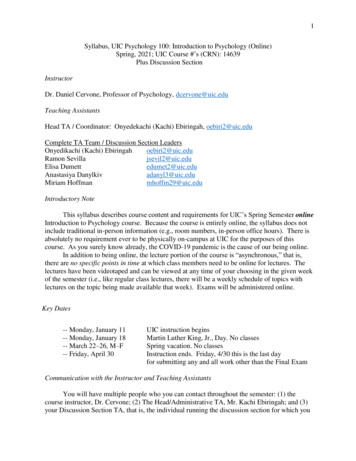
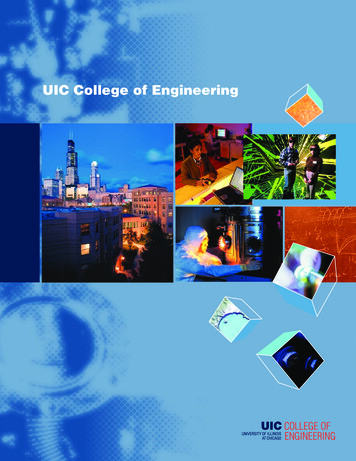

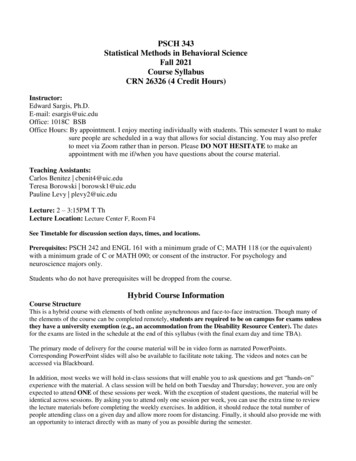
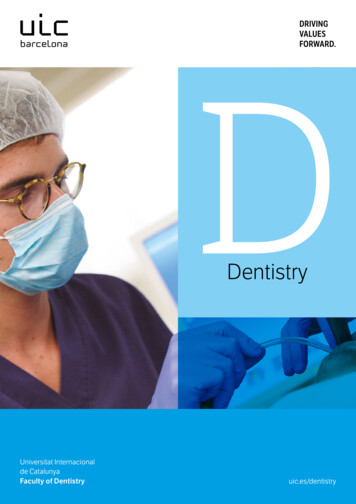
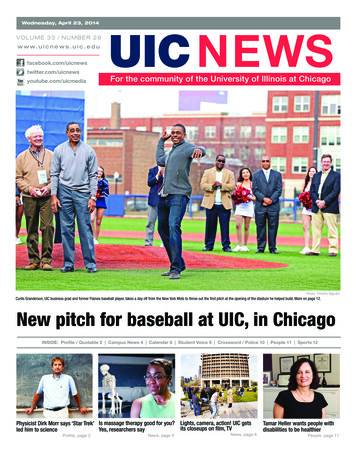

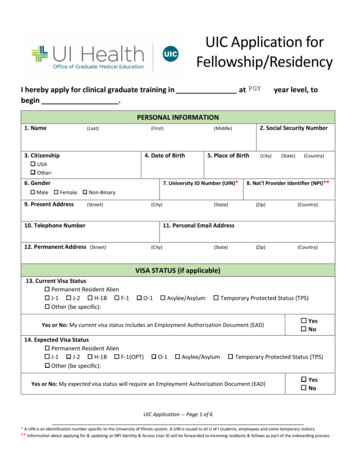
![Chap3 Airline Economics[2] - George Mason University](/img/36/chap3-airline-economics-5b2-5d.jpg)
